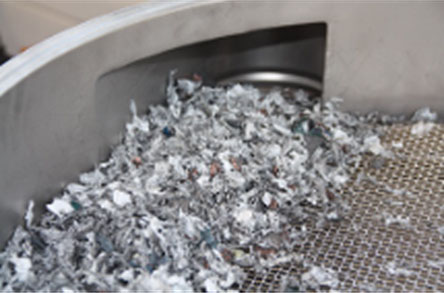DIGISORT – Digitalisation of mechanical sorting processes in mechanical battery recycling
The project deals with the digitalisation of mechanical separation processes in recycling using the example of wind classifying of shredded lithium-ion batteries going far beyond the state of the art through the development and use of new measurement technology and data analysis. The mechanical separation processes have the task of converting battery fragments into different streams with the highest possible content of valuables. The fragments typically have a size of 0.1 – 30 mm and vary in size, mass or composition depending on the battery type processed and the previous shredding step. Therefore, the separation processes must be able to process feeds of dynamically changing composition converting them reliably into high quality products. According to the state of the art, a campaign operation is typically carried out, i.e. the feed material is pre-sorted and only batteries with the same or similar process behaviour are processed together. Due to the increasing number of battery types, mechanical recycling plants face challenges in the future in continuing to produce sufficiently high-quality concentrates.
The DIGISORT project is therefore developing a measurement technology capable of recording the relevant properties of the shredded material on-line and in-line. This recording is not done as an integral parameter, but individually for each fragment which means an enormous depth of information. The data is obtained by combining image data with spectroscopic or hyperspectral information. In the application, the data provides precise information about when which particles, with which shape and composition are processed. The corresponding large data sets must be processed and structured in order to develop engineering correlations. This is done using machine learning tools.
In a first step, the process data is exemplified in a conventional process control strategy. In the future, the data quantity and quality will also enable adaptive dynamic model-based control. The control of the separation step is intended to increase selectivity and thus product quality and yield. The separation of electrode foils serves as a relevant example of application. Those foils are investigated with model aluminium and copper mixtures as well as real shredder products. The corresponding data sets are incorporated into the data management of the Recycling / Green Battery Cluster.
In the future, the combined measurement and control technology of DIGISORT can not only be applied to separation steps but along the entire recycling process chain for quality monitoring and data acquisition. Also, the application is not limited to recycling processes of Li-ion batteries but can be adapted to a variety of other applications.
Contact
Technische Universität Bergakademie Freiberg – Institute of Mechanical Process Engineering and Mineral Processing
Prof. Dr.-Ing. Urs Alexander Peuker
Alexandra Kaas
Agricolastraße 1, KKB 1057, 09599 Freiberg
Duration of project
01/2021 – 12/2023
Involved partners
